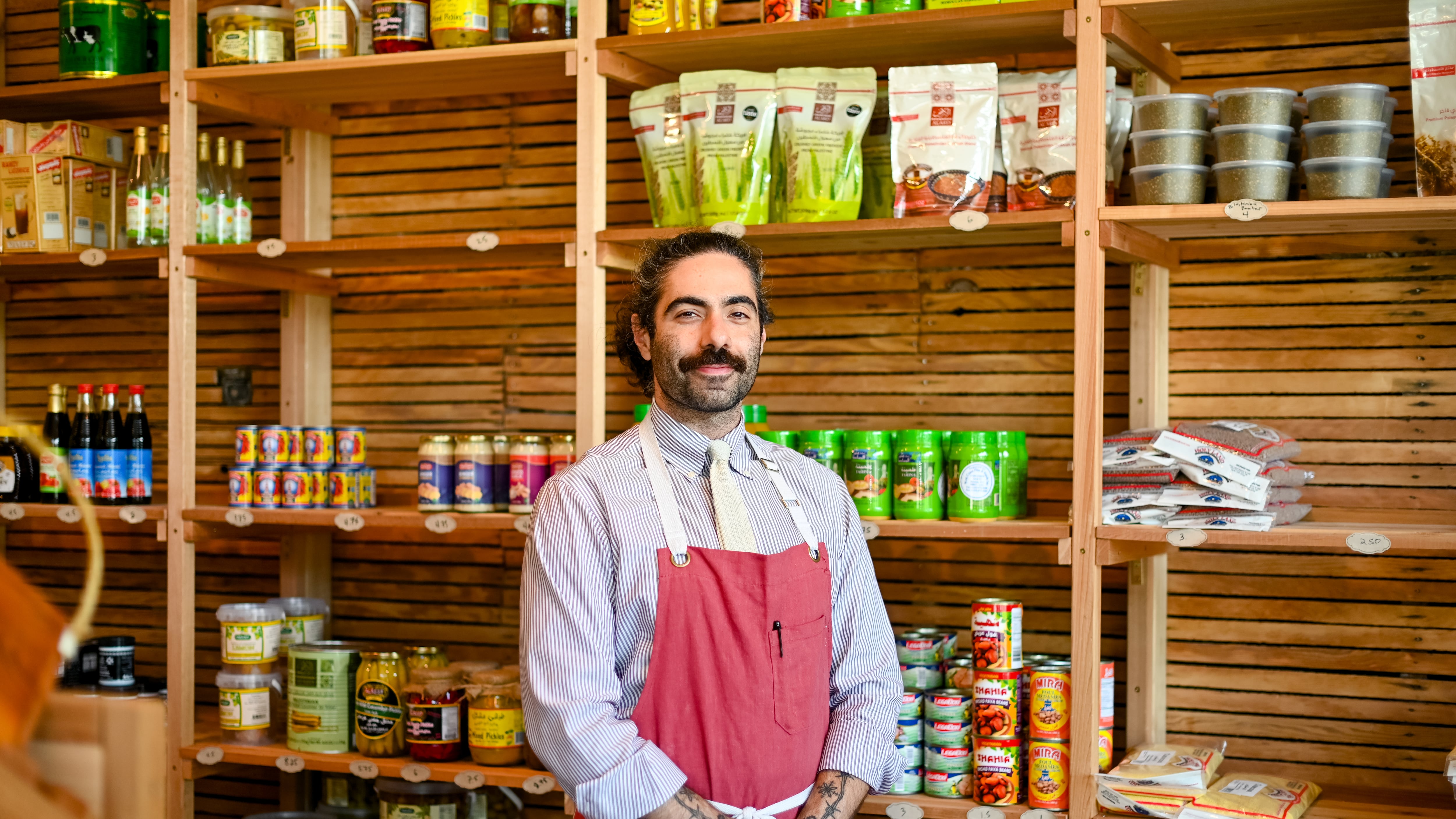On a single shelf inside Jerusalem Rose Market, you’ll find apricot fruit leather from Syria, a murky green tub of Jordanian Balady olives and Palestine’s Al’Ard black seed paste. Owner Ramzy Farouki built that shelf himself, and a few more, to hold dips, grains, spices, sauces, oils, candies, teas, and preserves at his new Northeast Portland storefront.
Most items come from nations in Southwest Asia and North Africa. Some hail directly from cities in the occupied West Bank: Ramallah, Nablus, Taybeh. A smaller amount are from U.S.-based Palestinian makers, and fewer still from Farouki’s own kitchen in Portland, where his mother whips fresh labneh, mashes foul madames, and blends hummus and moutabal to stock the market fridge.
“It’s a Palestinian market, but that means it has Iraqi, Syrian, Lebanese, Northern African goods,” he says. He then points to a value-size rectangular tin of Holy Land Olive Oil. “There’s the stuff from back home [in Palestine], but then this is from Palestinians like me. They’re in Minneapolis, so they’re Palestinians in the diaspora.”
Farouki grew up in a proud Palestinian community in St. Louis, Missouri. In 1948, Zionist paramilitary groups forced his family from their home in Jerusalem. After seeking refuge in Ramallah, then Kuwait, the family moved to the United States in 1970. At a young age, he understood the concept of displacement.
“It was a common topic,” he recalls. “I knew that something had happened to us and we couldn’t engage in our family history.” "
Even so, Farouki’s St. Louis community was rich with shared Palestinian culture, foods, and language. He remembers coming home to his grandfather’s cooking and carpentry projects, reading his grandmother’s poems and listening to her spoken histories. He also recalls sprinting to the back of his favorite Arabic market, Farid’s, to see which of the mountain of VHS tapes was playing that day on the decades-old television set.
Those memories live on the walls of Jerusalem Rose Market. Framed sepia prints of Farouki’s ancestors dot the wood panels near the register, and a boxy 1994 TV perched atop a doorway plays Farouki’s favorite Arabic flicks.
And then, there’s the stuff you can actually buy. In the fridges sit beer bottles from Taybeh, Palestine’s first microbrewery. Below them, Baghdadi Pepsi knocks hips with slender bottles of Mission, an Iraqi orange drink that fizzes on the tongue like a dissolvable vitamin C tablet. Slabs of Ackawi cheese floating in brine snuggle up to containers of dips made by Farouki’s mother, the “Jerusalem Rose’' after whom the market is named.
Since the grand opening in late May, the market racks have been fully stocked and Farouki hasn’t tired of looking at them.
“Arabic product design is so fire. Are you kidding me?” he asks, pointing at a red and yellow box of Egyptian El Arosa Tea. “This thing looks like a Marlboro packet! Who copied who!?”
Farouki himself is as critical a fixture in the market as are the shelves he built. If not straightening the family photos or chatting with an interested patron about the etymology of “halawa,” he’s sitting behind the cashier’s counter. Lifting his mask to take sips of coffee from a small glass thimble, he catalogues old family photos and prepares for upcoming “Weekly Palestine” educational sessions, which he runs on the Instagram page of the market’s neighbor, the Center for the Study and Preservation of Palestine (CSPP).
Though a natural market owner, Farouki is foremost a Palestinian cultural preservationist. He built the market to be both an avenue to educate folks about Palestinian culture, and a way to fund independent research at the CSPP.
“Between the CSPP and the market, I want to share and preserve everything that is the Palestinian identity. The intangible things like knowledge and history, but also the physical things,” Farouki says. “By supporting Palestinian makers, you’re solidifying their existence.”
GO: Jerusalem Rose Market, 2948 NE Martin Luther King Jr Blvd., 503-805-2963, instagram.com/jerusalemrosemarket. 9 am-7 pm Tuesday-Sunday.
